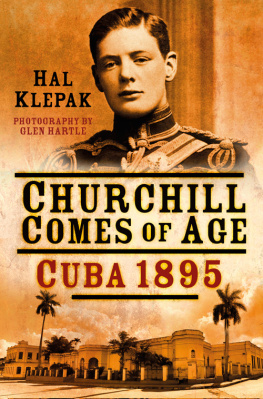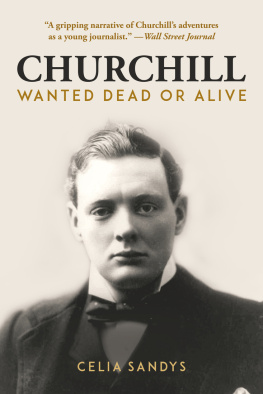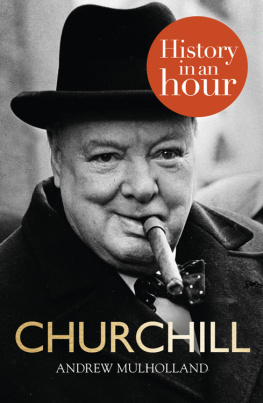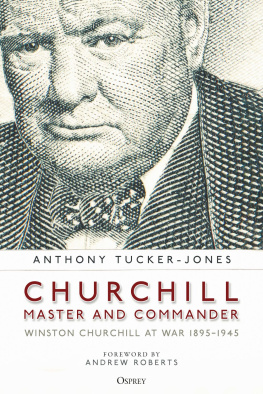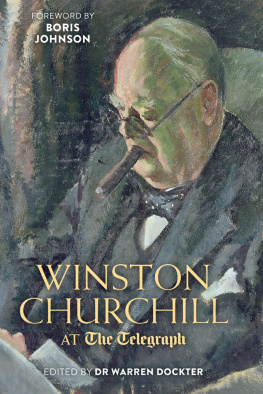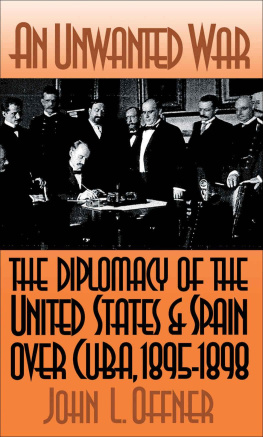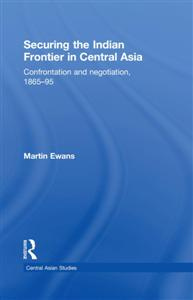
To the Memory of
Sir Winston Churchill, KG, OM, CH, TD, DL, FRS
(18741965)
Winner of the Red Cross of Military Merit for his comportment in Cuba in 1895, long before the rest of these honours but already emblematic of them all
The Greatest Briton who ever lived and the greatest inspiration to Britain and the Commonwealth they
have ever had
The research for this book took place in many places as did its drafting. It was necessary to travel to Cuba on several occasions, to Spain on one and to the United Kingdom three times. In those countries much time was spent in a variety of cities. In Cuba it proved worthwhile to visit the archives and historic sites Churchill would have seen not only in Havana but on the way to the war zone Coln, Santo Domingo, Santa Clara and Cienfuegos and in that zone Tunas de Zaza, Sancti Spiritus, Arroyo Blanco, Jicotea, Ciego de vila and Jcaro. Many other sites of interest to the story were also visited. It will not be possible to thank as they deserve the many average citizens of Cuba who assisted me and my graphics designer and photographer, Glen Hartle, in our work of discovering the route Churchill took in Cuba and the kinds of things he saw and faced there, but we thank them here.
Travelling in the modern Europe of the EU is of course much easier. But in Spain it proved important to visit not only Madrid but also the historic town of Segovia to the north. And in England the trail led not only to London but to Cambridge, Hove, Oxford, Blenheim and Churchills beloved Chartwell in Kent. While drafting the volume could be done mostly in Havana and Ottawa, the research effort produced considerable strain at times, complexities only confronted successfully because of the number and commitment of many people along the way, again far too numerous to mention as they deserve. But Churchills name opened doors throughout these countries and made the adventure a delight overall.
In Canada, my thanks must go to Glen Hartle, the photographer and friend just mentioned who, investing his own time and money, has been a wonderful boon to the project. It is beyond me to express how central he was to producing the present book because of his vast knowledge of graphics, computers and photography and his love for Cuba and admiration for Churchill. It is also a pleasure to acknowledge the enormous assistance of my friend Gordon Vachon who, as often in the past, offered his tireless efforts in reviewing the manuscript with his formidable editorial skills and knowledge. Also I thank Gords wife, Linda, who yet again patiently kept the home fires burning while I worked for part of the time on drafting and reviewing this book out of their home in Ottawa. The inspiration and assistance of Ronald Cohen, MBE, with his vast knowledge of Churchill and devotion to his memory, was essential for success. Also more than supportive there was Paul Durand.
In Britain, my thanks go out to a number of scholars. That list is headed by Maxine Molyneux, director of the Institute of the Americas, who arranged for me to use that institute as a base for my research at Kew, the British Library, Hove and Cambridge, and to her staff, especially Abi Espie and Oscar Martnez. The words of encouragement, practical guidance and friendship of Tony Kapcia, Head of the Forum for the Study of Cuba, were also helpful beyond measure. At Cambridge, Allen Packwood, Director of the Churchill Archive, could not have been more welcoming and supportive of me and the project. Mark Bunt and others at the Hove Library, home of the Wolseley Papers, were also efficient and welcoming and deserve much thanks. As always at the National Archives the personnel were efficient and ready to help at all times. Major David Innes-Lumsden, regimental secretary of the Queens Royal Hussars at Regents Park Barracks in London, allowed instantly complete access to the regiments archives and book collection as well as its valuable photos and sketches, and supplemented this with thoughts of his own. He arranged a visit to the regiment at Sennelager in northern Germany, where Captain Mark Cubitt, the adjutant, Second Lieutenant Sebastian Durrant and the highly knowledgeable Warrant Officer II Arran Bevington-King received me graciously and helped me through their collection of useful documents and photos not only of Churchill but also of General Reginald Barnes.
Celia Sandys, far from jealously guarding her turf where her grandfathers memory is concerned, was attentive and supportive from the start, and meeting and working with her has been an honour and an inspiration. At Chartwell, Wayne Thornton leapt into the breach more than once to assist. The British ambassador to Cuba, Tim Cole, opened doors and showed a keen interest in the project, kindly answering my appeal for assistance for the work Lourdes Mndez was doing on Churchill in her village.
In Cuba, a place where it is not easy to do research without local support, I had it in large quantities. I have pleasure in acknowledging the ideas of Lourdes Mndez Vargas, whose first thinking on Churchills visit to her beloved village of Arroyo Blanco stimulated both her work and mine. Her friends at museums in Arroyo Blanco and in Jatibonico were also willing to assist in many ways including the difficult task of discovering exactly where key sites from the time were to be found. Gustavo Placers guidance and steadiness were essential to success in ways too many to cite. Also of great help was the Director of the Institute for the History of Cuba, Colonel Ren Gonzlez Barrios, who knows the Spanish Army in the Cuba of 1895 like no one else, and who generously shared his knowledge with me.
Nancy Machado at the Jos Mart National Library of Cuba smoothed things for me in my use of that essential place. My friend Jos Abreu Cardet in Holgun kept me on the straight and narrow more than once, as he has done often in the past in my sojourns into Cuban history. The city historian of Sancti Spiritus, Mara Antonieta Jimnez, guided me through the history of her town and province despite her being terribly busy with preparations in 2014 for the 500th anniversary of the founding of the town. Similar help was provided by Hedy guila Zamora, a historian of the city of Santa Clara, who not only provided much useful information but also introduced me to the journalist Arnaldo Daz who was equally willing to share his often intriguing stock of photos and documents with the author.
In Spain, Captain Agustn Pacheco, Esperanza Vega Morn and Luis Mateo Gonzlez at the Servicio Histrico Militar bent over backwards to assist me in going through that vast and invaluable archive in Madrid. Their colleagues at the Archivo General Militar in Segovia were also welcoming and a great help. Staff at the Biblioteca Nacional and the Archivo Histrico Nacional likewise were more than willing to be of assistance despite the difficulties through which Spanish diplomatic archives are currently passing.
In the United States I benefitted not only from the constant interest and support of Lee Pollock, the Executive Director of the Churchill Centre, but through him from an anonymous donor who provided invaluable assistance to a project that until then was funded entirely from my own pension. Others who helped more than they may know are Clara Adorna Pea, Yuniesky lvarez Gonzlez, Gilbertico de la Torre Pea, Israidel Espinosa Arias, Captain Paul and Jamie Dempsey, Ricardo Guardarramo, John Kirk, Emily Kirk, Librada Morales, Emily Morris, Odalys Gorcias Durn, Ian Kemp, Colonel Jos Pardo de Santayana, Neriberto Prez Valds, Alberto Prieto, Chantal Quinn, Jess Ramos, Maril Uralde and Roman Jarymowycz. Without the inspiration of the late Francisco Prez Guzmn, this book might never have seen the light of day.
Next page
